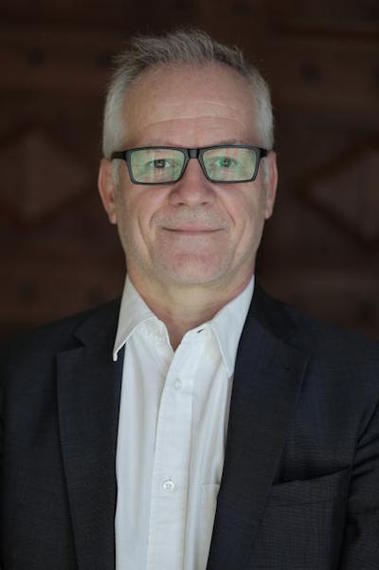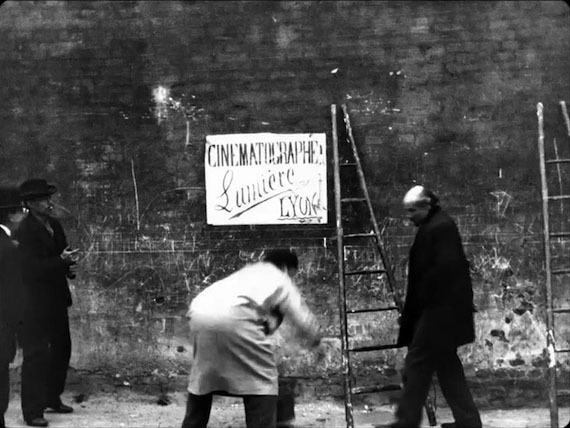What if you could take a journey through space and time and find yourself back in 1895 at the very moment of the invention of something so groundbreaking and new, it may seem nearly impossible to imagine? Well, contrary to what it sounds like, this is not the tagline of the latest sci-fi movie, or another sequel to Back to the Future -- it was the easiest way I could grab your attention in presenting the wonder that is Lumière! a cinematic presentation by Thierry Frémaux.
For cinema insiders of course Monsieur Frémaux needs no introduction, he is the legendary artistic director of the Festival de Cannes. He is also the director of the Institut Lumière in Lyon, which is where his passion for the inventors of modern cinema, as we know and love it today, comes from. When I use the word passion in his case, I am not throwing it around lightly. His enthusiasm for the films of the Lumière brothers, Auguste and Louis, is infectious and now that he's curated them into a full-length film collection that is presented in exclusive settings with his live commentary, he has easily conquered quite a few new fans for the French inventors of the movie camera.
Lumière!, which lucky audiences got to experience at the Dubai International Film Festival, is a wondrous voyage. A peek inside a society that although captured more than a century ago -- to be precise from 1895 to 1905 -- still lives on in its humanity. The short films of little boys and girls hamming it up for the camera, the "first special effects", as Frémaux joked commenting on a film that shows a wall being destroyed, played forward and then backwards, the Lyon of circa 1895, those glimpses feel like a precious commodity. And it doesn't hurt to be accompanied on that journey by Frémaux's wonderful soft tone and charming French accent.
As an extra treat, as if watching Lumière! wasn't enough, I got to sit and chat with Frémaux in Dubai and ask him about his film, his passions and of course, Cannes.
There was a moment during your screening when you talked about it being the perfect storm. The right moment in time for the Lumière to be coming up with cinema, since so many had been working towards inventing the moving image. So what is the perfect moment in time for cinema now?
 Thierry Frémaux: That's a very good question because when they invented cinema it was that utopia, a dream. And the dream was really to have people represent themselves by the animated images. And one century and twenty years later, cinema is not the only way to make images of the world. Because we have television and now, the internet... But cinema as an art, cinema as a social practice, is still here and it resists. It resists physically, and a young country like China -- China is a young country of films -- but it's becoming right now the most important country of cinema. It's good that China which is really looking to the future, includes in this future something like cinema. That invention, which is not only making images -- because you can make images, away from cinema -- but that invention which was an art, but also something we share together. What I was saying yesterday it was a good idea at the time because the idea of Thomas Edison was the individual machine. You'd have to put money in and that idea is American. The French guy said, "lets put everyone in the same room" so Edison said, "that's crazy, because what if nobody pays..."
Thierry Frémaux: That's a very good question because when they invented cinema it was that utopia, a dream. And the dream was really to have people represent themselves by the animated images. And one century and twenty years later, cinema is not the only way to make images of the world. Because we have television and now, the internet... But cinema as an art, cinema as a social practice, is still here and it resists. It resists physically, and a young country like China -- China is a young country of films -- but it's becoming right now the most important country of cinema. It's good that China which is really looking to the future, includes in this future something like cinema. That invention, which is not only making images -- because you can make images, away from cinema -- but that invention which was an art, but also something we share together. What I was saying yesterday it was a good idea at the time because the idea of Thomas Edison was the individual machine. You'd have to put money in and that idea is American. The French guy said, "lets put everyone in the same room" so Edison said, "that's crazy, because what if nobody pays..."
This (he picks up my smartphone) is an individual machine. I can watch a film on a smartphone today. But it's not cinema.
Why not?
Frémaux: First of all, because if I watch a film with this, and with my headphones on, it's not cinema. I prefer to be with you and say WOW!
But isn't that old fashioned?
Frémaux: I don't want to say that cinema is totally alone -- but it's included in a big world now. My kids, they are twelve and fourteen, the whole day are on their mobiles, but if I say Saturday night we go to the movies, suddenly they are as excited as if I say we go to the stadium. Watching a game on TV and being in the stadium, I'm talking about football, it's not the same. Cinema is the same.
Today in music, because of the piracy, because of the legal downloading, people don't buy anymore CDs. So the music groups, they have to go back, even the Rolling Stones, not only in Cuba, they have to go back on stage. A concert is not a CD, so a film on the big screen is not a film on a smartphone or on my computer, or on the plane. I love to watch films on the plane, especially French films. I am crying because I am lonely, far away from my country. But it's not the same experience than being in the Chinese Theater on Hollywood Boulevard or being inside a big screening or here on opening night. Every screening room is something really specific, each country. If I go to Moscow to watch a film there or in China or Paris... When Quentin Tarantino comes to Paris, he has his own theater. It's like a need, he needs to go there. That is cinema.
Do you sometimes watch films in different countries, the same film, do you like to do that?
Frémaux: For Cannes you mean?
Or for example watch an American film in Paris.
Frémaux: Oh yeah I do that. But for example I hate popcorn, except in America. I love to have people eating popcorn around me when I'm in New York or Los Angeles, or in Chicago. I hate it in Paris, because in Paris it's an imitation of America. In America, it is America.
What Netflix is doing now, long episodes of their series, do you think that threatens cinema?
Frémaux: If we mention the TV series, it's the golden age of that. And it's wonderful but for two things. First, why I'm waiting for a story told in 18 hours when I can see a wonderful story told in one hour and a half? Second, it's great actors, great makers but it's a TV series. Put a TV series in a screening room and I'm not sure it works. Cinema is cinema, there is something quite demanding about being in a movie theater. One of the issues of TV will be to make films of two hours, and that would be quite dangerous for cinema. It would really be the same thing.
Film and music have the biggest impact on us in our teenage years. What was your relationship to film in your teenage years?
Frémaux: Like everyone on earth, everyone loves cinema when you are ten, twelve, fourteen, and you go to the movies with friends. And then around sixteen, seventeen, eighteen, little by little you are separated from your friends because they still go to watch bullshit commercial stuff and, as Martin Scorsese used to say, once you know a name of a director you are a movie buff. Because when you are young of course, you know actors or actresses but a filmmaker, as Capra used to call it, "the name above the title," then you are a buff. I think cinema has a lot to say about you. But it's like other passions, like sports or rock and roll. I feel I'm part of the world because this world is mine. That's why it's always connected to your own spirit, cinema. For example in my city, Lyon, I know the city by heart because of cinemas. Even those who disappeared.
Do you think filmmakers are the prophets of our times?
Frémaux: Artist -- yes. Filmmakers, but also poets and writers. I think more and more. For example, if you take French politics now, and especially the left side, they lost the words and words are very important. Donald Trump didn't lose words. His own words! But he has that. And I think that yes the confrontation with the world needs artists because sometimes you need someone to tell it in another way to you. And sometimes a director, singer, poet, or writer, or even a guy in contemporary art like Jeff Koons shows you something you can't get out by yourself. I think that in every country, every government needs a man in charge of culture but like a court jester -- the "Fou du Roi". Out of politics, alone, independent but with money. Someone who says "no, no Mr. Trump, let me show you something..."
Can you talk a bit about the mystical place that is Cannes, for that week and a half, once a year?
Frémaux: Cannes, we forget who we are. We are in Cannes, for two weeks we are there watching films talking films. Sometimes Cannes is criticized for the red carpet, about the juries, but that is made up by people who don't go to Cannes. We all know that in Cannes, from the first coffee in the morning until the last whiskey in the night, the main conversation is cinema.
And if you don't watch films during the day, you can't talk about anything. It is like flowers, they need water. Our water in Cannes is watching films. We could stay home, no I don't go to Cannes I'll stay home and watch films on my smartphone... At times it really feels like the place to be, it fills the blood desire. And that is wonderful -- it's magic.
Portrait of Thierry Frémaux by Gareth Cattermole at Getty Images; all photos courtesy of DIFF, used with permission.

